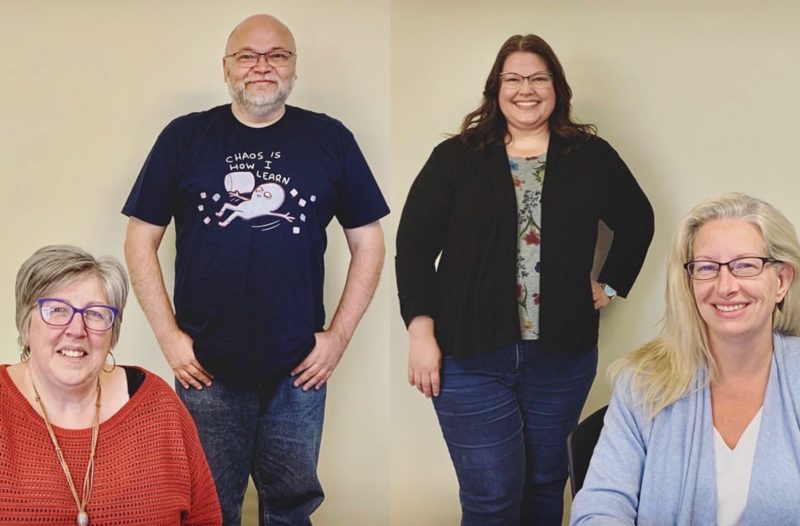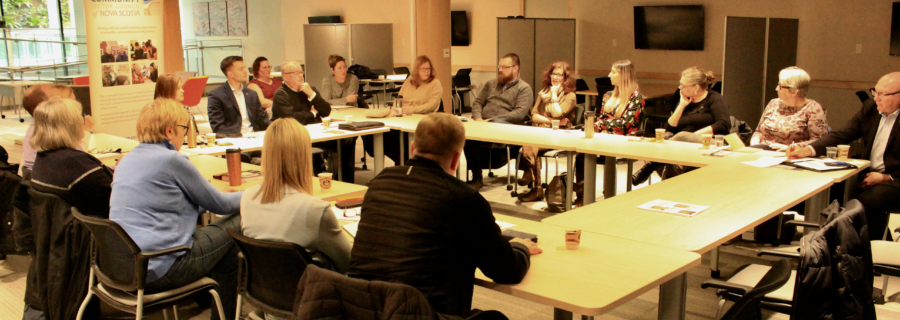A notion has always floated around that nonprofits are the heart of the Nova Scotia economy. Their economic contribution is rivaled only by their ability to bridge the gap in societal needs, which are otherwise unmet.
“I find nonprofits rich, exciting, creative and collaborative like every other organization,” says Patricia Bradshaw, professor of management at Saint Mary’s University and volunteer board co-chair of Community Sector Council of Nova Scotia.
“They have volunteers and people working there who are just so purpose driven, that I feel good about being part of that sector.”
The Atlantic Provinces Economic Council estimates Nova Scotian nonprofits directly contribute $1 billion in Gross Domestic Product (GPD) to the economy. They represent the third largest contributor. The sector also accounts for 2.5 per cent of the province’s total value of goods produced and services provided in one year.
The large GDP figure is just the direct measurable impact of nonprofits. Both their direct and indirect impacts bring the total contribution up to $1.7 billion. Their unmeasurable contributions include access to programming and quality of life improvements for their communities.
“We have 175 clients and serve close to 2,500 meals per month,” says Pam Vaters, executive director of Dartmouth Seniors Service Centre. “We prep, cook, package and deliver Meals on Wheels to Dartmouth, Eastern Passage, Cole Harbour and Waverley.”
According to a report by the Community Sector Council of Nova Scotia in the fall of 2019, nonprofits have been facing many challenges. Now with the prevalent effects of the pandemic, they’re facing even tougher barriers than before.
“We closed our Centre on March 17,” says Vaters. “But our Meals on Wheels program that’s been around since the 80s is still in operation with new rules and regulations for COVID-19.”
Pre-existing funding challenges
The sector has quickly grown from 2007 to 2017. However, this growth has been slowly decreasing in recent years, as funding has slowed down from nine to less than one per cent.
“We've traditionally looked at the world through what's called a scarcity mindset. And if you have a scarcity mindset, you compete more,” says Bradshaw.
Excluding governmental nonprofits, obtaining funding and the uncertainty in maintaining funding every year are their number one challenge.
“The challenge for us is the same as it is for many small nonprofits: to secure constant and adequate funding,” says Lynn Yetman, executive director of Healthy Minds Cooperative. The Dartmouth non-profit organization will celebrate 15 years in the community this June.
Small nonprofits like Healthy Minds (the only mental health co-op in Canada) have three key sources of funding: government, earned income and donations. Since most nonprofits are providing services on behalf of the government, their support is crucial and represents more than half of funding.
Employment, wages and volunteerism before COVID-19
With over 20,000 Nova Scotians employed in nonprofits, the sector is similar in size to the transportation and the financial services industries in the province. Yet, non-profit wages are very low. Their wages are 20 per cent below the average of all the other industries in Nova Scotia and 16 per cent below nonprofits nationally.
“If 70 per cent of the workforce is women who traditionally get paid less than men, then it could be because of gender disparity,” says Bradshaw about non-profit executive directors and more than half of board members being women.
The main reason nonprofits are contributing so much to the economy and society, despite lower wages and funding, is volunteerism. The estimated economic value of volunteer hours spent on Nova Scotian nonprofits in 2018 is around $1.5 billion. It accounts for 60 per cent of the labour resources required for nonprofits to operate.
“Staffing takes up a lot of our funds and we are all compassionate people who choose to work for less,” says Vaters. “But we could never survive without our amazing volunteers.”
The province has the highest rates of volunteerism in Canada, but it’s been on the decline since 2007 –– a trend widespread across Canada. Even a decline as low as five per cent will be equivalent to a loss of 3.2 million hours. Such a decline would push nonprofits to rely more on paid staff and automating and/or reducing their services.
Nova Scotia’s labour challenge
The amount of funding received has cascading effects in any organization including lower salaries, difficulties in recruiting and inadequate investments in training and professional development.
“There's a labour shortage across all businesses, government and non-profit sectors; everybody is trying to attract the same workers,” says Bradshaw.
On top of these challenges, non-profit employees are overworked. Wearing several hats at a time is creating stress on employees and making it difficult to potentially retain them.
“Nonprofits are successful in hiring new grads, but then they don't stay,” says Bradshaw. “It’s a combination of both attracting and retaining; we're working really hard at attracting but having real challenges with retention.”
Labour challenges aside, nonprofits are the most diverse sector of the economy. They’ve been hiring immigrants to help fill the gaps. “We’re hiring a higher proportion of almost every marginalized group than other sectors,” says Bradshaw.
“We’re getting more creative at hiring new immigrants and hiring traditionally marginalized, excluded groups either with disabilities or from the indigenous and black communities.”
Despite the decreases in funding, the sector has been working hard to overcome them and continue providing their services. They’ve been systematically making the workplace more attractive with improved wages, flexibility in work schedules, modifying job descriptions and increasing training.
COVID-19 impact on the state of nonprofits in Nova Scotia
Due to the pandemic, the sector’s usual fundraisers and special events are cancelled. Disruptions in services to clients and customers are extensive. Revenues from sales of goods and services are lost. Plus, challenges in staffing and managing volunteers while social distancing are proven to be rigorous. All of these challenges have resulted in layoffs and insufficient financial resources.
“We sell our meals for $8 but since the pandemic and the fact that we are not holding events to offset the deficit, the cost to us now is $10.66 per meal,” says Vaters about Meals on Wheels. “There are between 600 to 700 meals per week provided to our clients and a loss of $2.66 per meal, which is about $1,200 to $1,400 loss per week."
"We had to lay off 14 staff.”
Only seven per cent of the sector is functioning regularly. Almost half are still working under modifications like working from home. And the remaining nonprofits have shut down operations until further notice.
A few nonprofits have reopened with the help of the Canada Emergency Wage Subsidy. But the rest can’t sustain themselves since they’re missing out on project funding, membership fees and other fees. Close to half are ceasing or reducing operations and cutting costs. About one third are unsure of what their future looks like and how to navigate it.
“Funding is still very much an issue; we were under funded from the start,” says Yetman. “And with COVID-19, adapting to online services takes money for equipment, upgrades, platforms and sound quality.”
A lot of uncertainties are impacting the future of nonprofits in Nova Scotia. As previously expected, cascading effects will have further repercussions on the social, cultural, recreational and artistic life of the province.
“The operating budget is something I worry about because we are running at a loss daily and how will we survive if this keeps us closed past October,” says Vaters. “Even if we did open, I believe it will take months or a year to be back to a breakeven margin.”
The federal government announced in May the $350 million Emergency Community Support Fund to improve the ability of community organizations to serve vulnerable Canadians during the COVID-19 crisis. Applications opened on May 19 and the funding will be distributed through the United Way, the Canadian Red Cross and Community Foundations of Canada.
The Community Sector Council of Nova Scotia recommends a Sustainability Fund to be established. Additionally, short-term funding needs to be made available to help nonprofits remain viable in the short run –– then to rebuild and recover the sector.
“We do have grants coming our way and we are so thankful,” says Vaters. “But these grants have very strict guidelines to follow as to how we can use them.”
“As a community, we’re doing our very best to help each other deal with this pandemic,” she says. “I’m proud of our Government, proud of organizations like the Halifax Chamber and proud of our people, for keeping this province going in spite of the risks involved.”
“Even as I'm writing this, my eyes are cloudy with tears and my heart is full of joy.”
According to Bradshaw, a third of nonprofits is being called on with higher demand, such as the food banks and the frontline services who are receiving money from the United Way's compassion fund.
“We may have to start to amalgamate organizations and some are starting to already,” says Bradshaw. “There's a big push in the sector to shift from the scarcity mindset to an abundance mindset.”
The abundance mindset assumes there are enough funds for all nonprofits. It’s only possible if they work together and collaborate systemically to access those funds as one unit, but still have enough money for every organization.
“What we're beginning to see are people looking innovatively,” says Bradshaw. “There’s a new Nova Scotia non-profit COVID-19 coalition in the making and its members are envisioning a bold, innovative future for the sector.”
“They’re going to ensure we go into the new normal with that mindset, rather than replicating the promise of the past.”
Read more about APEC's report on the state of the nonprofit sector in Nova Scotia here.


< Back to Articles | Topics: Cover story

